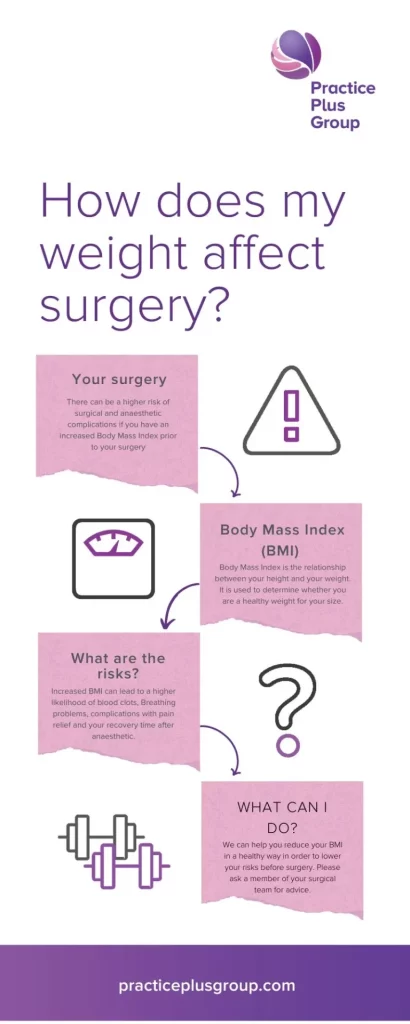Estimated reading time: 4 minutes
If you’re facing surgery, it can be a natural impulse to focus on the operation and what comes afterward. But did you know that what you do beforehand can have a big impact on your recovery?
Quitting smoking, cutting down on alcohol, and exercising before surgery, often referred to as pre-habilitation or “prehab,” are all simple but powerful ways of preparing your body for the challenges ahead. Whether you’re scheduled for minor or major surgery, incorporating exercise into your pre-surgery routine can help you bounce back faster and with fewer complications.
In this article, we explore the many benefits of exercising before surgery and how it can set the stage for a smoother, quicker recovery.
What are the benefits of pre-operative exercise?
Pre-habilitation is all about taking a proactive approach to surgery. If you focus on building your strength, fitness, and overall health before your operation, the post-op results can be greatly improved. Think of it as getting your body in the best possible shape to handle the stress of surgery.
A comprehensive (but not exhaustive) list of the benefits of being more active before surgery includes:
1. Recover faster
One of the biggest benefits of prehabilitation is that it can help you recover faster after surgery. By strengthening your muscles and improving your cardiovascular fitness, your body will be better equipped to heal. This means you’re likely to experience less pain, regain mobility quicker and get back to your hobbies sooner.
2. Reduce the risk of surgical complications
A fitter, stronger body is less likely to experience complications during and after surgery.
According to a study from 2023, high intensity interval training (HIIT) before surgery can improve cardiorespiratory fitness and reduce complications.1 Another study suggested that patients who had a daily step count of over 7,500 before an operation were almost half as likely to experience complications.2 It’s also important to remember that pre-surgery exercise doesn’t need to be as strenuous as a HIIT workout. Just 30 minutes of exercise, five times a week is enough to improve your fitness.
3. Experience better mental health
Studies have shown that anxiety is a risk factor for greater postoperative pain. They have also shown that depression can negatively affect wound healing.3
Surgery is stressful, but exercise can also have a positive impact on your mental health. Regular exercise is known to reduce anxiety and boost mood, helping you approach your surgery with a more positive mindset. Feeling stronger and more in control can also alleviate some of the worry about your upcoming procedure.
4. Get a better surgical outcome
Studies have shown that patients who engage in pre-habilitation tend to have better overall surgical outcomes. This includes not only physical recovery but also a smoother, more straightforward surgical process.
5. Prevent muscle loss
After surgery, you’ll most likely need to spend more time resting. As you may expect, a prolonged period of rest can lead to muscle loss. By building up your muscle strength before surgery, you can work to slow this loss down. Strength training exercises, in particular, can help maintain muscle mass during the recovery period and reduce the risk of falls in older patients. This can make it easier to regain your strength and mobility post-op.
6. Improve your posture and mobility
Certain surgeries, such as those involving the spine, hips, or knees, can impact your posture and mobility. Exercise can help improve these areas before surgery, leading to better outcomes. For example, strengthening your core muscles can support your spine, while flexibility exercises can keep your joints supple. This, in turn, can also reduce stiffness and discomfort after surgery.
Did you know?
People who follow an exercise programme reduce their risk of complications of surgery by around 40%5
Pre-habilitation exercises for surgery
Pre-surgery exercise doesn’t have to be intense or time-consuming. In fact, it’s most effective when it’s tailored to your specific needs and the type of surgery you’ll be having.
A physiotherapist or exercise specialist can design an exercise programme that focuses on strengthening the areas of your body that will be most affected by the surgery. This personalised approach ensures you’re getting the maximum benefit from your pre-surgery workouts.
Here’s what a typical prehab programme might include:
1. Aerobic exercise
Building cardiovascular fitness is crucial for improving your body’s endurance and circulation. Activities like walking, cycling, or swimming can boost your heart and lung health while improving your body’s ability to cope with surgery.
2. Strength training
Strengthening key muscle groups can support your body during recovery. For example, leg exercises before knee surgery, or core exercises before abdominal surgery. Strength training can also help prevent muscle loss, which is common after surgery due to reduced physical activity through the need for rest.
3. Flexibility and balance
Improving flexibility and balance can actually help increase your mobility after surgery. Stretching exercises and balance training are particularly effective in this regard.
4. Breathing exercises
If you’re having chest or abdominal surgery, breathing exercises can be a vital part of your prehab. These activities improve lung function and help to avoid post-op complications such as pneumonia.

How to get started
If you’re preparing for surgery, there’s no better time than now to start incorporating exercise into your daily routine. Read on to find out how you can begin:
- Before starting any exercise programme, it’s important to consult your doctor or surgeon, especially if you have any underlying health conditions
- A physiotherapist or certified trainer can help create a safe and effective exercise plan tailored to your needs
- If you’re new to exercise, begin with low-impact activities like walking, swimming, or cycling. You should increase the intensity (gradually!) as your fitness improves
- Depending on your surgery, focus on exercises that strengthen your core, improve cardiovascular fitness, and increase flexibility.
Did you know?
As little as 30 minutes’ exercise, five days a week is enough to improve your fitness.4 If you aren’t able to do 30 minutes of exercise, it’s important to remember that any physical activity – no matter how little – is better than nothing.
Helpful resources
The help doesn’t end there. Below, we’ve put together a list of resources to help strengthen your body and mind before your procedure.
- Read our returning to exercise guide
- Getting back into golf after a hip replacement
- Exercise after a hip replacement
- Exercise after a knee replacement
- The NHS fitness studio has lots of free exercises videos to try
There’s no doubt about it, exercising before surgery is an effective way of taking control of your health and recovery. Whether you’re having a minor procedure or major surgery, a little exercise can go a long way in helping you get back on your feet and back to your life.
So why wait? Start your pre-surgery exercise routine today and give yourself the best chance of a smooth and speedy recovery.
Sources and references
1 https://jamanetwork.com/journals/jamanetworkopen/fullarticle/2806718
2 https://www.eurekalert.org/news-releases/1005225
3 https://www.sciencedirect.com/science/article/pii/S0007091222006328?via%3Dihub
4 Centre for Perioperative Care: Exercise in preparation for surgery
5 https://services.nhslothian.scot/preparingforsurgery/western-general-hospital/getting-fit-for-surgery-wg/

Acknowledgements
FAQs
Still have unanswered questions about exercise before surgery? You might find the answer in our frequently asked questions section.
Yes, yes, and yes! Exercising before surgery can significantly improve your recovery. Not only does it strengthen your muscles, it also boosts your cardiovascular health and enhances your overall fitness. All of these benefits combine to make it easier for your body to handle the stresses of surgery.
To strengthen your body before surgery, focus on a balanced exercise routine. This should include cardiovascular exercises (like walking or swimming), strength training (such as light weightlifting or resistance bands) and flexibility exercises (like stretching or yoga). Don’t forget to include upper body exercises too. Depending on the nature of your treatment, you may need to spend time using equipment like elbow crutches to get around. It’s best to work with a physiotherapist or a certified trainer who can tailor a programme to your specific needs and the type of surgery you’ll be having.
Yes, it’s important to rest the day before surgery. While exercise in the weeks before surgery is beneficial, giving your body time to rest and recover before the procedure is crucial. Avoid strenuous activities and focus on relaxation, hydration, and getting a good night’s sleep to ensure you feel rested and ready.
It’s usually a sensible idea to avoid exercise on the day of surgery. Your body needs to be in a calm, rested state to handle the procedure. Instead, focus on light activities like deep breathing exercises or gentle stretching if you feel up to it. Your main priority should be arriving at the hospital well-rested and relaxed.
Lifting weights before surgery can be beneficial, but it should be done with caution. Strength training helps build muscle, which can protect your body during surgery and aid in recovery. However, it’s important not to overdo it, especially as the surgery date approaches. Stick to lighter weights and focus on proper form.
Consult your doctor or a physiotherapist to ensure you’re lifting safely and effectively.
It’s not recommended. First, you need to make sure your body is rested and prepared for what’s to come. Second, picking up an injury may delay your recovery and even the surgery itself. Running or any intense exercise could also leave you dehydrated, fatigued, or overly stressed. Instead, opt for relaxation techniques like deep breathing or meditation to keep yourself calm and focused.






